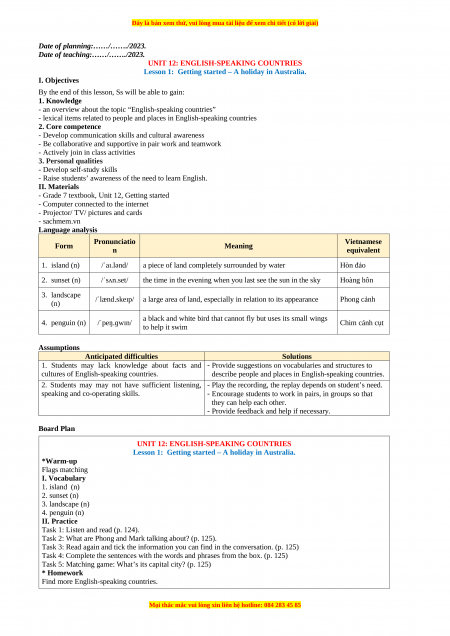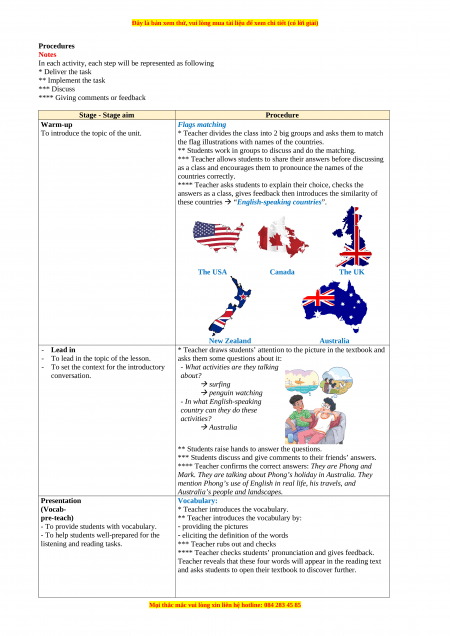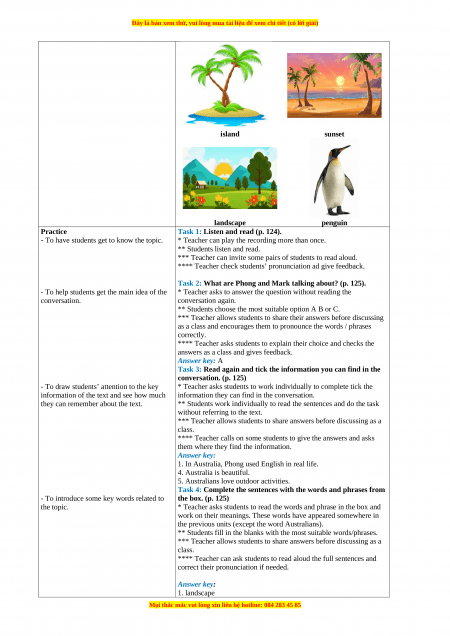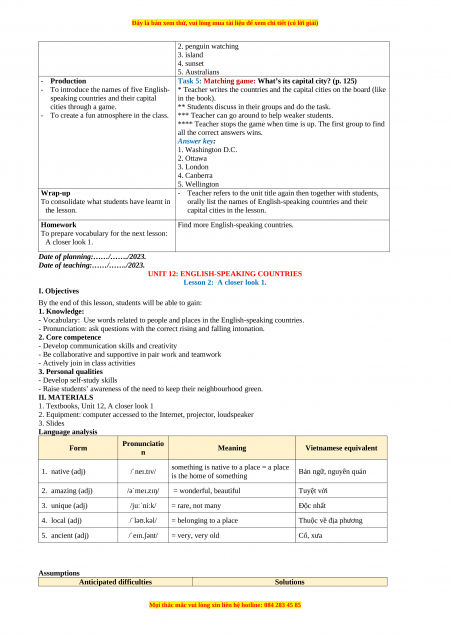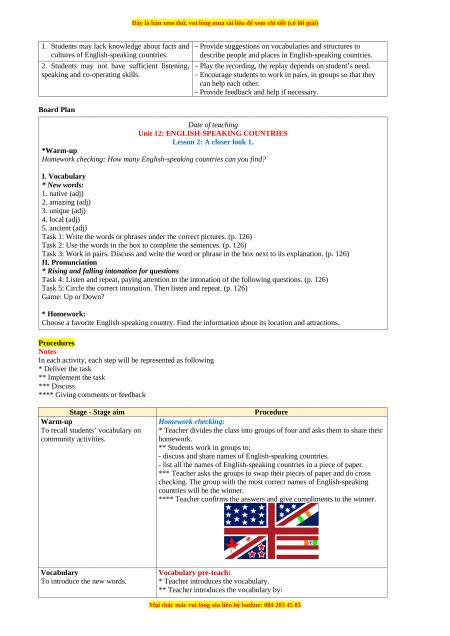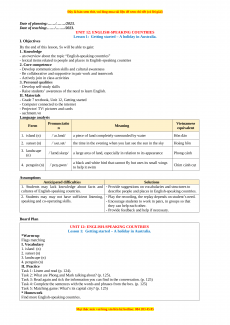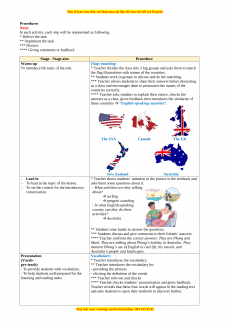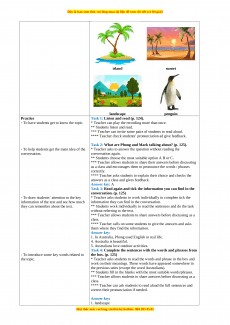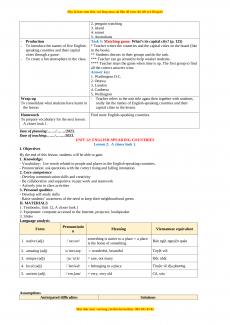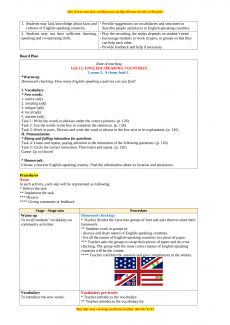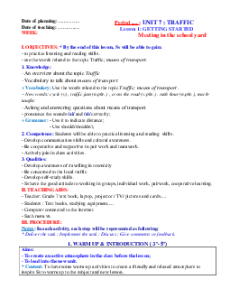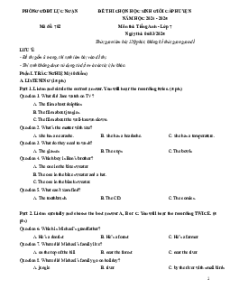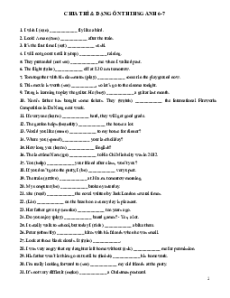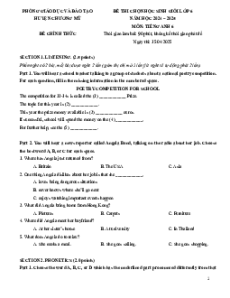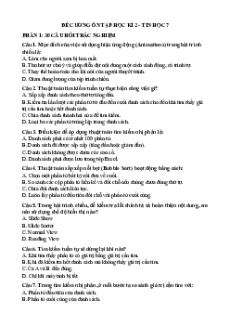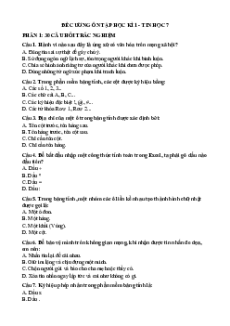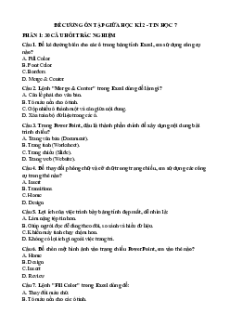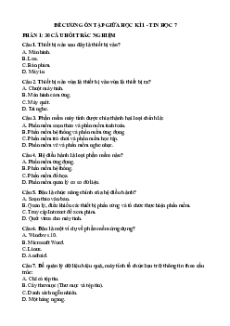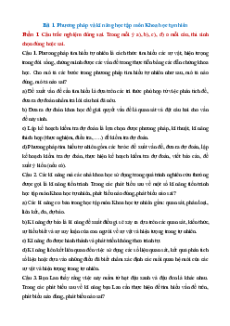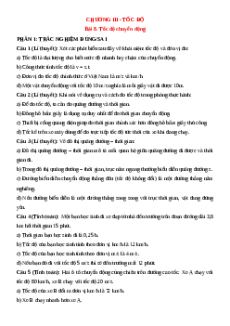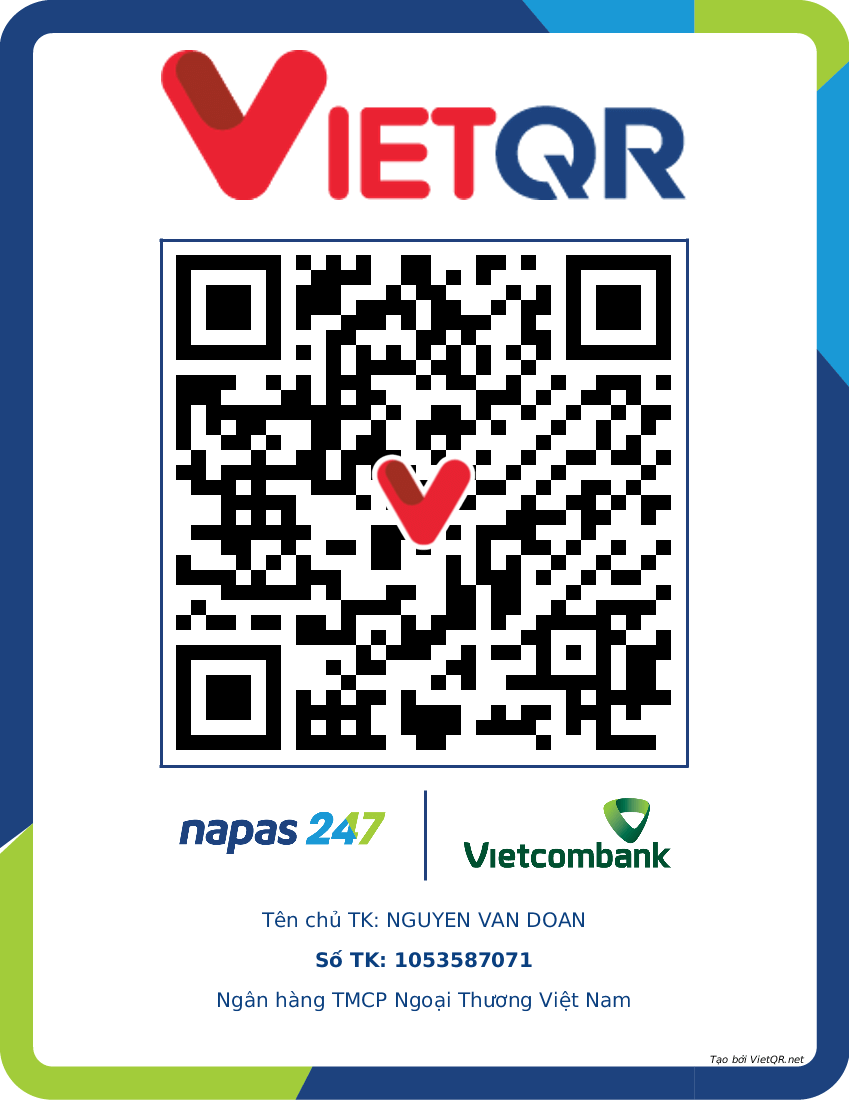Date of planning:……/……./2023.
Date of teaching:……/……./2023.
UNIT 12: ENGLISH-SPEAKING COUNTRIES
Lesson 1: Getting started – A holiday in Australia. I. Objectives
By the end of this lesson, Ss will be able to gain: 1. Knowledge
- an overview about the topic “English-speaking countries”
- lexical items related to people and places in English-speaking countries 2. Core competence
- Develop communication skills and cultural awareness
- Be collaborative and supportive in pair work and teamwork
- Actively join in class activities 3. Personal qualities
- Develop self-study skills
- Raise students’ awareness of the need to learn English. II. Materials
- Grade 7 textbook, Unit 12, Getting started
- Computer connected to the internet
- Projector/ TV/ pictures and cards - sachmem.vn Language analysis Pronunciatio Vietnamese Form Meaning n equivalent 1. island (n) /ˈaɪ.lənd/
a piece of land completely surrounded by water Hòn đảo 2. sunset (n) /ˈsʌn.set/
the time in the evening when you last see the sun in the sky Hoàng hôn 3. landscape /ˈlænd.skeɪp/
a large area of land, especially in relation to its appearance Phong cảnh (n)
a black and white bird that cannot fly but uses its small wings 4. penguin (n) /ˈpeŋ.ɡwɪn/ Chim cánh cụt to help it swim Assumptions
Anticipated difficulties Solutions
1. Students may lack knowledge about facts and - Provide suggestions on vocabularies and structures to
cultures of English-speaking countries.
describe people and places in English-speaking countries.
2. Students may may not have sufficient listening, - Play the recording, the replay depends on student’s need.
speaking and co-operating skills.
- Encourage students to work in pairs, in groups so that they can help each other.
- Provide feedback and help if necessary. Board Plan
UNIT 12: ENGLISH-SPEAKING COUNTRIES
Lesson 1: Getting started – A holiday in Australia. *Warm-up Flags matching I. Vocabulary 1. island (n) 2. sunset (n) 3. landscape (n) 4. penguin (n) II. Practice
Task 1: Listen and read (p. 124).
Task 2: What are Phong and Mark talking about? (p. 125).
Task 3: Read again and tick the information you can find in the conversation. (p. 125)
Task 4: Complete the sentences with the words and phrases from the box. (p. 125)
Task 5: Matching game: What’s its capital city? (p. 125) * Homework
Find more English-speaking countries.
Procedures Notes
In each activity, each step will be represented as following * Deliver the task ** Implement the task *** Discuss
**** Giving comments or feedback Stage - Stage aim Procedure Warm-up Flags matching
To introduce the topic of the unit.
* Teacher divides the class into 2 big groups and asks them to match
the flag illustrations with names of the countries.
** Students work in groups to discuss and do the matching.
*** Teacher allows students to share their answers before discussing
as a class and encourages them to pronounce the names of the countries correctly.
**** Teacher asks students to explain their choice, checks the
answers as a class, gives feedback then introduces the similarity of
these countries “English-speaking countries”. The USA Canada The UK New Zealand Australia - Lead in
* Teacher draws students’ attention to the picture in the textbook and
- To lead in the topic of the lesson.
asks them some questions about it:
- To set the context for the introductory
- What activities are they talking conversation. about? surfing
penguin watching - In what English-speaking country can they do these activities? Australia
** Students raise hands to answer the questions.
*** Students discuss and give comments to their friends’ answers.
**** Teacher confirms the correct answers: They are Phong and
Mark. They are talking about Phong’s holiday in Australia. They
mention Phong’s use of English in real life, his travels, and
Australia’s people and landscapes. Presentation Vocabulary: (Vocab-
* Teacher introduces the vocabulary. pre-teach)
** Teacher introduces the vocabulary by:
- To provide students with vocabulary. - providing the pictures
- To help students well-prepared for the
- eliciting the definition of the words listening and reading tasks.
*** Teacher rubs out and checks
**** Teacher checks students’ pronunciation and gives feedback.
Teacher reveals that these four words will appear in the reading text
and asks students to open their textbook to discover further.
island sunset landscape penguin Practice
Task 1: Listen and read (p. 124).
- To have students get to know the topic.
* Teacher can play the recording more than once. ** Students listen and read.
*** Teacher can invite some pairs of students to read aloud.
**** Teacher check students’ pronunciation ad give feedback.
Task 2: What are Phong and Mark talking about? (p. 125).
- To help students get the main idea of the
* Teacher asks to answer the question without reading the conversation. conversation again.
** Students choose the most suitable option A B or C.
*** Teacher allows students to share their answers before discussing
as a class and encourages them to pronounce the words / phrases correctly.
**** Teacher asks students to explain their choice and checks the
answers as a class and gives feedback. Answer key: A
Task 3: Read again and tick the information you can find in the conversation. (p. 125)
- To draw students’ attention to the key
* Teacher asks students to work individually to complete tick the
information of the text and see how much
information they can find in the conversation.
they can remember about the text.
** Students work individually to read the sentences and do the task without referring to the text.
*** Teacher allows students to share answers before discussing as a class.
**** Teacher calls on some students to give the answers and asks
them where they find the information. Answer key:
1. In Australia, Phong used English in real life. 4. Australia is beautiful.
5. Australians love outdoor activities.
Task 4: Complete the sentences with the words and phrases from
- To introduce some key words related to the box. (p. 125) the topic.
* Teacher asks students to read the words and phrase in the box and
work on their meanings. These words have appeared somewhere in
the previous units (except the word Australians).
** Students fill in the blanks with the most suitable words/phrases.
*** Teacher allows students to share answers before discussing as a class.
**** Teacher can ask students to read aloud the full sentences and
correct their pronunciation if needed. Answer key: 1. landscape
2. penguin watching 3. island 4. sunset 5. Australians - Production
Task 5: Matching game: What’s its capital city? (p. 125)
- To introduce the names of five English- * Teacher writes the countries and the capital cities on the board (like
speaking countries and their capital in the book). cities through a game.
** Students discuss in their groups and do the task.
- To create a fun atmosphere in the class.
*** Teacher can go around to help weaker students.
**** Teacher stops the game when time is up. The first group to find all the correct answers wins. Answer key: 1. Washington D.C. 2. Ottawa 3. London 4. Canberra 5. Wellington Wrap-up
- Teacher refers to the unit title again then together with students,
To consolidate what students have learnt in
orally list the names of English-speaking countries and their the lesson. capital cities in the lesson. Homework
Find more English-speaking countries.
To prepare vocabulary for the next lesson: A closer look 1.
Date of planning:……/……./2023.
Date of teaching:……/……./2023.
UNIT 12: ENGLISH-SPEAKING COUNTRIES
Lesson 2: A closer look 1. I. Objectives
By the end of this lesson, students will be able to gain: 1. Knowledge:
- Vocabulary: Use words related to people and places in the English-speaking countries.
- Pronunciation: ask questions with the correct rising and falling intonation. 2. Core competence
- Develop communication skills and creativity
- Be collaborative and supportive in pair work and teamwork
- Actively join in class activities 3. Personal qualities
- Develop self-study skills
- Raise students’ awareness of the need to keep their neighbourhood green. II. MATERIALS
1. Textbooks, Unit 12, A closer look 1
2. Equipment: computer accessed to the Internet, projector, loudspeaker 3. Slides Language analysis Pronunciatio Form Meaning Vietnamese equivalent n
something is native to a place = a place 1. native (adj) /ˈneɪ.tɪv/ Bản ngữ, nguyên quán is the home of something 2. amazing (adj) /əˈmeɪ.zɪŋ/ = wonderful, beautiful Tuyệt vời 3. unique (adj) /juːˈniːk/ = rare, not many Độc nhất 4. local (adj) /ˈləʊ.kəl/ = belonging to a place Thuộc về địa phương 5. ancient (adj) /ˈeɪn.ʃənt/ = very, very old Cổ, xưa Assumptions
Anticipated difficulties Solutions
Giáo án Unit 12: English-speaking countries Tiếng Anh 7 Global success
0.9 K
460 lượt tải
MUA NGAY ĐỂ XEM TOÀN BỘ TÀI LIỆU
CÁCH MUA:
- B1: Gửi phí vào TK:
1133836868- CT TNHH DAU TU VA DV GD VIETJACK - Ngân hàng MB (QR) - B2: Nhắn tin tới Zalo VietJack Official ( nhấn vào đây ) để xác nhận thanh toán và tải tài liệu - giáo án
Liên hệ ngay Hotline hỗ trợ: 084 283 45 85
Bộ giáo án Tiếng Anh 7 Global success được cập nhật liên tục trong gói này từ nay đến hết tháng 6/2023.
Để tải tài liệu gốc về máy bạn click vào nút Tải Xuống ở trên!
Thuộc bộ (mua theo bộ để tiết kiệm hơn):
- Bộ giáo án Tiếng Anh 7 Global success năm 2023 mới, chuẩn nhất được thiết kế theo phong cách hiện đại, đẹp mắt, trình bày chi tiết cho từng bài học và bám sát chương trình Sách giáo khoa Tiếng Anh 7 Global success.
- Mua trọn bộ sẽ tiết kiệm hơn tải lẻ 50%.
Đánh giá
4.6 / 5(920 )5
4
3
2
1
Trọng Bình
Tài liệu hay
Giúp ích cho tôi rất nhiều
Duy Trần
Tài liệu chuẩn
Rất thích tài liệu bên VJ soạn (bám sát chương trình dạy)
TÀI LIỆU BỘ BÁN CHẠY MÔN Tiếng Anh
Xem thêmTÀI LIỆU BỘ BÁN CHẠY Lớp 7
Xem thêmTài liệu bộ mới nhất

Đây là bản xem thử, vui lòng mua tài liệu để xem chi tiết (có lời giải)
Date of planning:……/……./2023.
Date of teaching:……/……./2023.
UNIT 12: ENGLISH-SPEAKING COUNTRIES
Lesson 1: Getting started – A holiday in Australia.
I. Objectives
By the end of this lesson, Ss will be able to gain:
1. Knowledge
- an overview about the topic “English-speaking countries”
- lexical items related to people and places in English-speaking countries
2. Core competence
- Develop communication skills and cultural awareness
- Be collaborative and supportive in pair work and teamwork
- Actively join in class activities
3. Personal qualities
- Develop self-study skills
- Raise students’ awareness of the need to learn English.
II. Materials
- Grade 7 textbook, Unit 12, Getting started
- Computer connected to the internet
- Projector/ TV/ pictures and cards
- sachmem.vn
Language analysis
Form
Pronunciatio
n
Meaning
Vietnamese
equivalent
1. island (n) /ˈaɪ.lənd/ a piece of land completely surrounded by water Hòn đảo
2. sunset (n) /ˈsʌn.set/ the time in the evening when you last see the sun in the sky Hoàng hôn
3. landscape
(n)
/ˈlænd.skeɪp/ a large area of land, especially in relation to its appearance Phong cảnh
4. penguin (n) /ˈpeŋ.ɡwɪn/
a black and white bird that cannot fly but uses its small wings
to help it swim
Chim cánh cụt
Assumptions
Anticipated difficulties Solutions
1. Students may lack knowledge about facts and
cultures of English-speaking countries.
- Provide suggestions on vocabularies and structures to
describe people and places in English-speaking countries.
2. Students may may not have sufficient listening,
speaking and co-operating skills.
- Play the recording, the replay depends on student’s need.
- Encourage students to work in pairs, in groups so that
they can help each other.
- Provide feedback and help if necessary.
Board Plan
UNIT 12: ENGLISH-SPEAKING COUNTRIES
Lesson 1: Getting started – A holiday in Australia.
*Warm-up
Flags matching
I. Vocabulary
1. island (n)
2. sunset (n)
3. landscape (n)
4. penguin (n)
II. Practice
Task 1: Listen and read (p. 124).
Task 2: What are Phong and Mark talking about? (p. 125).
Task 3: Read again and tick the information you can find in the conversation. (p. 125)
Task 4: Complete the sentences with the words and phrases from the box. (p. 125)
Task 5: Matching game: What’s its capital city? (p. 125)
* Homework
Find more English-speaking countries.
Mọi thắc mắc vui lòng xin liên hệ hotline: 084 283 45 85

Đây là bản xem thử, vui lòng mua tài liệu để xem chi tiết (có lời giải)
Procedures
Notes
In each activity, each step will be represented as following
* Deliver the task
** Implement the task
*** Discuss
**** Giving comments or feedback
Stage - Stage aim Procedure
Warm-up
To introduce the topic of the unit.
Flags matching
* Teacher divides the class into 2 big groups and asks them to match
the flag illustrations with names of the countries.
** Students work in groups to discuss and do the matching.
*** Teacher allows students to share their answers before discussing
as a class and encourages them to pronounce the names of the
countries correctly.
**** Teacher asks students to explain their choice, checks the
answers as a class, gives feedback then introduces the similarity of
these countries “English-speaking countries”.
The USA Canada The UK
New Zealand Australia
- Lead in
- To lead in the topic of the lesson.
- To set the context for the introductory
conversation.
* Teacher draws students’ attention to the picture in the textbook and
asks them some questions about it:
- What activities are they talking
about?
surfing
penguin watching
- In what English-speaking
country can they do these
activities?
Australia
** Students raise hands to answer the questions.
*** Students discuss and give comments to their friends’ answers.
**** Teacher confirms the correct answers: They are Phong and
Mark. They are talking about Phong’s holiday in Australia. They
mention Phong’s use of English in real life, his travels, and
Australia’s people and landscapes.
Presentation
(Vocab-
pre-teach)
- To provide students with vocabulary.
- To help students well-prepared for the
listening and reading tasks.
Vocabulary:
* Teacher introduces the vocabulary.
** Teacher introduces the vocabulary by:
- providing the pictures
- eliciting the definition of the words
*** Teacher rubs out and checks
**** Teacher checks students’ pronunciation and gives feedback.
Teacher reveals that these four words will appear in the reading text
and asks students to open their textbook to discover further.
Mọi thắc mắc vui lòng xin liên hệ hotline: 084 283 45 85

Đây là bản xem thử, vui lòng mua tài liệu để xem chi tiết (có lời giải)
island sunset
landscape penguin
Practice
- To have students get to know the topic.
- To help students get the main idea of the
conversation.
- To draw students’ attention to the key
information of the text and see how much
they can remember about the text.
- To introduce some key words related to
the topic.
Task 1: Listen and read (p. 124).
* Teacher can play the recording more than once.
** Students listen and read.
*** Teacher can invite some pairs of students to read aloud.
**** Teacher check students’ pronunciation ad give feedback.
Task 2: What are Phong and Mark talking about? (p. 125).
* Teacher asks to answer the question without reading the
conversation again.
** Students choose the most suitable option A B or C.
*** Teacher allows students to share their answers before discussing
as a class and encourages them to pronounce the words / phrases
correctly.
**** Teacher asks students to explain their choice and checks the
answers as a class and gives feedback.
Answer key: A
Task 3: Read again and tick the information you can find in the
conversation. (p. 125)
* Teacher asks students to work individually to complete tick the
information they can find in the conversation.
** Students work individually to read the sentences and do the task
without referring to the text.
*** Teacher allows students to share answers before discussing as a
class.
**** Teacher calls on some students to give the answers and asks
them where they find the information.
Answer key:
1. In Australia, Phong used English in real life.
4. Australia is beautiful.
5. Australians love outdoor activities.
Task 4: Complete the sentences with the words and phrases from
the box. (p. 125)
* Teacher asks students to read the words and phrase in the box and
work on their meanings. These words have appeared somewhere in
the previous units (except the word Australians).
** Students fill in the blanks with the most suitable words/phrases.
*** Teacher allows students to share answers before discussing as a
class.
**** Teacher can ask students to read aloud the full sentences and
correct their pronunciation if needed.
Answer key:
1. landscape
Mọi thắc mắc vui lòng xin liên hệ hotline: 084 283 45 85

Đây là bản xem thử, vui lòng mua tài liệu để xem chi tiết (có lời giải)
2. penguin watching
3. island
4. sunset
5. Australians
- Production
- To introduce the names of five English-
speaking countries and their capital
cities through a game.
- To create a fun atmosphere in the class.
Task 5: Matching game: What’s its capital city? (p. 125)
* Teacher writes the countries and the capital cities on the board (like
in the book).
** Students discuss in their groups and do the task.
*** Teacher can go around to help weaker students.
**** Teacher stops the game when time is up. The first group to find
all the correct answers wins.
Answer key:
1. Washington D.C.
2. Ottawa
3. London
4. Canberra
5. Wellington
Wrap-up
To consolidate what students have learnt in
the lesson.
- Teacher refers to the unit title again then together with students,
orally list the names of English-speaking countries and their
capital cities in the lesson.
Homework
To prepare vocabulary for the next lesson:
A closer look 1.
Find more English-speaking countries.
Date of planning:……/……./2023.
Date of teaching:……/……./2023.
UNIT 12: ENGLISH-SPEAKING COUNTRIES
Lesson 2: A closer look 1.
I. Objectives
By the end of this lesson, students will be able to gain:
1. Knowledge:
- Vocabulary: Use words related to people and places in the English-speaking countries.
- Pronunciation: ask questions with the correct rising and falling intonation.
2. Core competence
- Develop communication skills and creativity
- Be collaborative and supportive in pair work and teamwork
- Actively join in class activities
3. Personal qualities
- Develop self-study skills
- Raise students’ awareness of the need to keep their neighbourhood green.
II. MATERIALS
1. Textbooks, Unit 12, A closer look 1
2. Equipment: computer accessed to the Internet, projector, loudspeaker
3. Slides
Language analysis
Form
Pronunciatio
n
Meaning Vietnamese equivalent
1. native (adj) /ˈneɪ.tɪv/
something is native to a place = a place
is the home of something
Bản ngữ, nguyên quán
2. amazing (adj) /əˈmeɪ.zɪŋ/ = wonderful, beautiful Tuyệt vời
3. unique (adj) /juːˈniːk/ = rare, not many Độc nhất
4. local (adj) /ˈləʊ.kəl/ = belonging to a place Thuộc về địa phương
5. ancient (adj) /ˈeɪn.ʃənt/ = very, very old Cổ, xưa
Assumptions
Anticipated difficulties Solutions
Mọi thắc mắc vui lòng xin liên hệ hotline: 084 283 45 85

Đây là bản xem thử, vui lòng mua tài liệu để xem chi tiết (có lời giải)
1. Students may lack knowledge about facts and
cultures of English-speaking countries.
- Provide suggestions on vocabularies and structures to
describe people and places in English-speaking countries.
2. Students may not have sufficient listening,
speaking and co-operating skills.
- Play the recording, the replay depends on student’s need.
- Encourage students to work in pairs, in groups so that they
can help each other.
- Provide feedback and help if necessary.
Board Plan
Date of teaching
Unit 12: ENGLISH-SPEAKING COUNTRIES
Lesson 2: A closer look 1.
*Warm-up
Homework checking: How many English-speaking countries can you find?
I. Vocabulary
* New words:
1. native (adj)
2. amazing (adj)
3. unique (adj)
4. local (adj)
5. ancient (adj)
Task 1: Write the words or phrases under the correct pictures. (p. 126)
Task 2: Use the words in the box to complete the sentences. (p. 126)
Task 3: Work in pairs. Discuss and write the word or phrase in the box next to its explanation. (p. 126)
II. Pronunciation
* Rising and falling intonation for questions
Task 4: Listen and repeat, paying attention to the intonation of the following questions. (p. 126)
Task 5: Circle the correct intonation. Then listen and repeat. (p. 126)
Game: Up or Down?
* Homework:
Choose a favorite English-speaking country. Find the information about its location and attractions.
Procedures
Notes
In each activity, each step will be represented as following
* Deliver the task
** Implement the task
*** Discuss
**** Giving comments or feedback
Stage - Stage aim Procedure
Warm-up
To recall students’ vocabulary on
community activities.
Homework checking:
* Teacher divides the class into groups of four and asks them to share their
homework.
** Students work in groups to:
- discuss and share names of English-speaking countries.
- list all the names of English-speaking countries in a piece of paper.
*** Teacher asks the groups to swap their pieces of paper and do cross
checking. The group with the most correct names of English-speaking
countries will be the winner.
**** Teacher confirms the answers and give compliments to the winner.
Vocabulary
To introduce the new words.
Vocabulary pre-teach:
* Teacher introduces the vocabulary.
** Teacher introduces the vocabulary by:
Mọi thắc mắc vui lòng xin liên hệ hotline: 084 283 45 85
